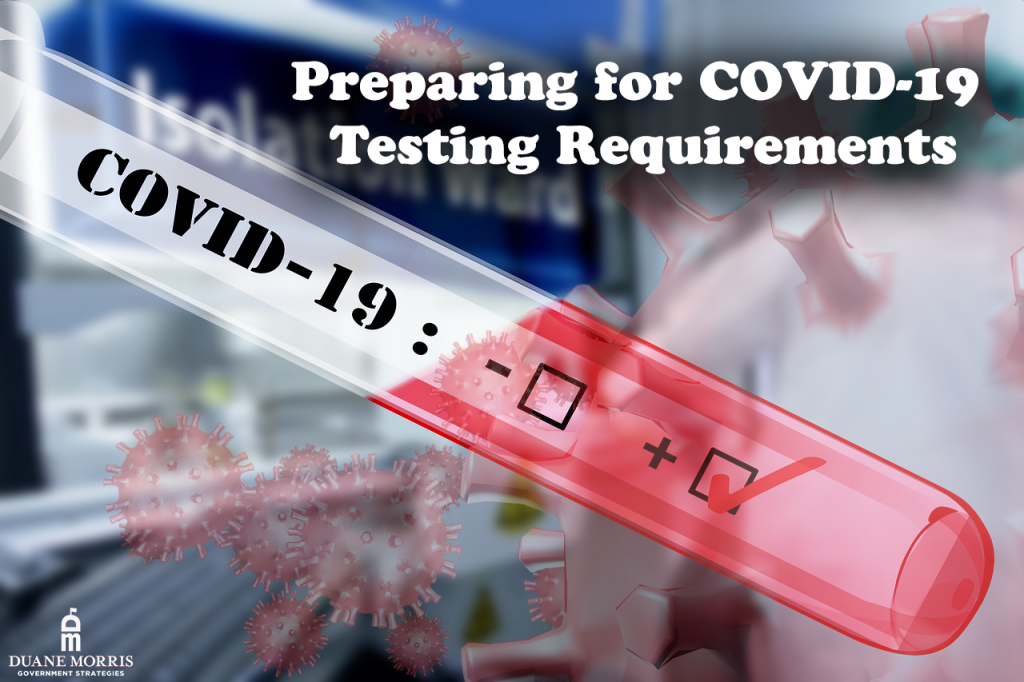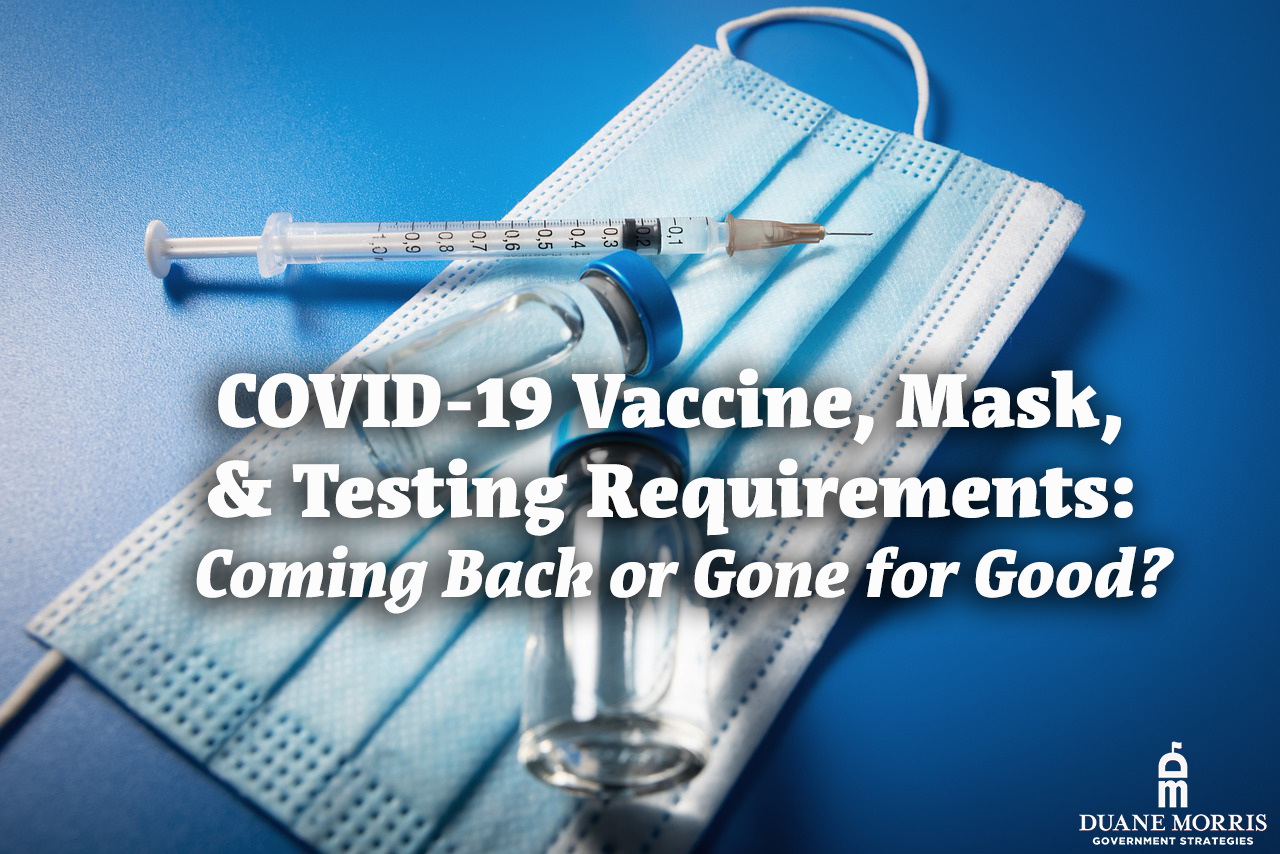
Last month, the U.S. Government (USG) announced that the Occupational Safety and Health Administration (OSHA) would introduce an Emergency Temporary Standards (ETS) requiring private-sector companies that employ 100 or more workers to require either proof of vaccination or weekly testing. OSHA is still working through its rulemaking for COVID-19 testing requirements, but USG is publicly pushing companies to act by December 8—the same deadline federal contractors must meet to vaccinate their employees. DMGS has already covered similar state government COVID-19 vaccine and testing mandates.
Covered Employers
Employers with more than 100 employees or those with fewer employees voluntarily complying with the OSHA standards would be subject to COVID-19 vaccination/testing requirements once a final rule is promulgated. Employers with fewer than 100 employees total, not including independent contractors, would be exempt. The guidance from the Safer Federal Workforce Task Force could suggest what OSHA will expect in the coming vaccination and testing requirements.
While details are limited, it currently appears that the requirements would be for any business with 100 employees or more. The ETS would likely not specify that an employer needs 100 employees at any particular site—the number is cumulative. However, the ETS is unlikely to require vaccination and testing of remote workers who do not visit worksites.
COVID-19 Testing Requirements
Each onsite employee would be required to prove vaccination or submit evidence of a negative COVID test weekly to meet the requirements of the OSHA ETS. The forthcoming ETS reportedly does not specify the type of COVID-19 test that employees must submit. Currently, federal agencies may use any viral test that the Food and Drug Administration (FDA) has authorized, such as a PCR or antigen test. Either test type may suffice from a federal perspective, but different state, local, and municipal governing bodies or private employers may have different standards.
COVID-19 Testing Options
PCR testing is a lab test that offers the highest sensitivity and specificity, which loosely translates to accuracy. PCR testing will detect COVID-19 at all stages of infection. While PCR testing is the “gold standard,” it can be costly and not as fast as antigen testing.
Antigen Testing is typically in rapid form—a simple test cassette like a pregnancy test—where a shallow, nasal specimen can be tested anywhere in as little as 10-20 minutes on average. This gives the test taker information quickly, and generally speaking, is less expensive than PCR testing. The most significant limitations are accuracy. Antigen tests tend only to pick up the infection once it has replicated enough to be contagious. If an employee tests within the first 24-72 hours of exposure, the chances of detecting the disease are not great, even if they end up contracting the virus.
While details are still scarce, there are a few directions employers may go:
1. PCR Surveillance Testing
PCR Testing can be as simple as employees spitting into a specimen tube or obtaining a shallow nasal swab once a week and sending it off to the lab. While individual PCR COVID-19 tests average $100 each, DMGS has established partnerships where a company can access PCR testing for as little as $20 per person.
2. Point-of-Care Rapid Antigen Testing
Point-of-Care Rapid Antigen tests are primarily sold by the box (20-25 tests) and require minimal oversight, lab waiver certification, and reporting requirements. In most states, lab certification is a brief application submitted via email accompanied by a $180 fee every other year. Reporting is often performed via a secure file transfer or upload done once weekly. The advantage to point-of-care testing is that it is cheap—about $7 per test (more or less dependent on volume) but does require increased administration.
3. Over-the-Counter Rapid Antigen Testing
Over-the-Counter style tests are predominantly the same as point-of-care in functionality but are labeled for individual sale and do not require oversight, lab waivers, or reporting. They are also generally more expensive—retailing about $25 for a two-pack.
While the USG is purchasing Over-the-Counter Rapid Antigen tests to push them into the marketplace through national pharmacy chains, it is very unclear if there will be enough for everyone who will need to test to go to work every week.
DMGS Support for COVID-19 Testing Requirements
Securing COVID-19 testing services and supplies is critical to ensure minimal disruption to an employer’s workforce once OSHA issues its ETS. Without a comprehensive vaccination requirement, an employer’s onsite workforce could be interrupted if unvaccinated workers cannot access tests independently.
Whether employers fund the cost of testing or pass the cost along to the employee, ensuring that a workforce has access to testing is critical to ensuring business continuity.
Through partnerships, DMGS has access to:
- PCR Testing starting at $20 per test
- Point-of-Care Rapid Antigen Tests averaging $7.50 per test (more or less dependent on volume)
- Over-the-Counter Rapid Antigen Tests averaging $10 per test (more or less dependent on volume)
Whatever comes, please know that DMGS is here to support you while we overcome the pandemic.
Contact Ryan Stevens at rjstevens@dmgs.com to learn more!
Latest News
In this episode of the Back in Session podcast, hosts Ryan Stevens and Ryan DeMara sit down with Terra McClelland, President of the State Government Affairs Council (SGAC) and Vice President of Government and External [...]
Photo credit: iStock.com/designer491 Various kinds of leave exist for workers, such as family leave, sick leave, parental leave, and vacation leave. In addition to these more traditional types of leave, after the Covid-19 pandemic, state [...]
Digital collage by Ryan Stevens; image sources by JillWellington and mmi9 from Pixabay Technological advancements in recent years have made virtual learning a possibility for K–12 schools. With virtual learning a possibility, some states and [...]
Digital collage by Ryan Stevens; image source by ronstik from Pixabay From the outset of the COVID-19 pandemic, DMGS has provided updates from various states looking to implement new restrictions or lift them. If you [...]






Stay In Touch